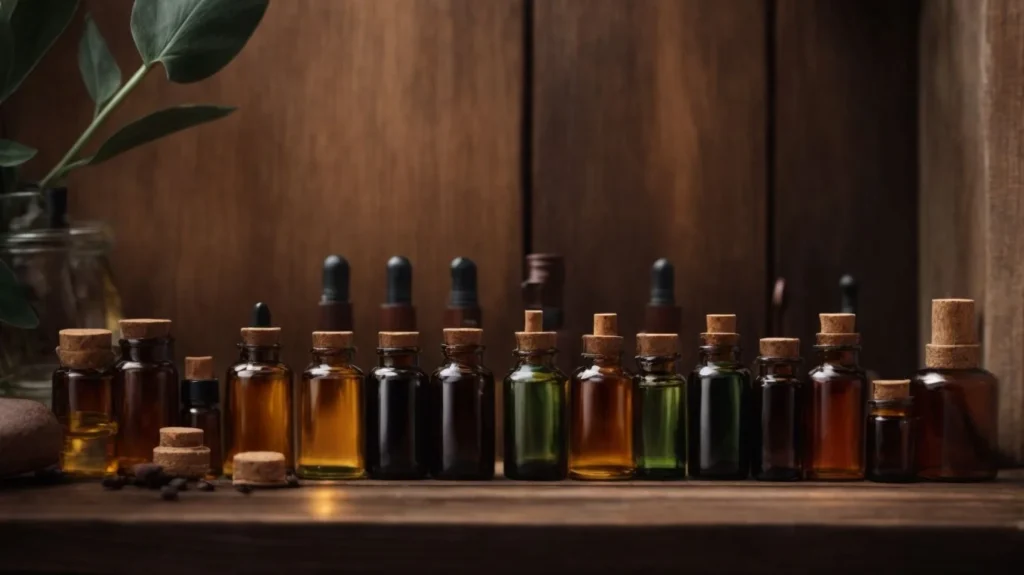Essential oils have gained popularity in the skincare world for their natural and beneficial properties. From anti-inflammatory to anti-aging benefits, these oils can work wonders for your skin. In this article, we will explore the top essential oils for skin, including lavender, tea tree, and rosehip oil. We will also discuss how to safely use essential oils on your skin and potential risks to be aware of.
If you want to learn more about incorporating essential oils into your skincare routine, keep reading!
What Are Essential Oils?
Essential oils are natural plant extracts that are often used in skincare for their beneficial properties on the skin.
These oils are typically extracted through methods like steam distillation or cold pressing, preserving the potent compounds found in plants such as lavender, chamomile oil, and jojoba oil. Each essential oil carries a unique aroma and therapeutic properties that can benefit different skin types and conditions.
For instance, lavender essential oil is well-known for its calming and soothing effects on the skin, making it ideal for sensitive or irritated skin. Chamomile oil, on the other hand, is cherished for its anti-inflammatory and anti-bacterial properties, making it a great choice for acne-prone or inflamed skin. Jojoba oil, a popular carrier oil, closely resembles the skin’s natural sebum and is excellent for moisturizing and balancing oil production.
How Do Essential Oils Benefit the Skin?
Essential oils offer a range of benefits for the skin, including soothing properties and natural remedies for common skin issues.
Among the vast array of essential oils that boast beneficial properties for the skin,
- rosemary oil,
- neroli oil, and
- bergamot stand out for their exceptional qualities.
Rosemary oil, renowned for its anti-inflammatory effects, can help reduce redness and puffiness, making it ideal for calming irritated skin. Neroli oil, with its moisturizing properties, can effectively hydrate dry skin and leave it feeling supple and rejuvenated. Bergamot, known for its antimicrobial benefits, can help combat acne-causing bacteria, contributing to clearer and healthier skin.
Anti-inflammatory Properties
Essential oils are known for their anti-inflammatory properties, making them effective in soothing irritated or inflamed skin.
Specific oils such as lavender and chamomile oil are particularly beneficial for reducing redness and inflammation. Lavender oil, renowned for its calming fragrance, has been used for centuries to alleviate skin irritations and promote relaxation.
Chamomile oil, with its gentle and soothing properties, can help calm sensitive skin, making it an excellent choice for those prone to redness and inflammation. Both oils work synergistically to provide a natural and gentle solution for skin concerns.
Antioxidant Properties
Essential oils contain antioxidant properties that help protect the skin from free radicals and environmental damage.
Regarding maintaining healthy-looking skin, antioxidants play a crucial role in preventing premature aging and maintaining a youthful complexion. Oils like rosemary and ylang-ylang are especially beneficial due to their potent antioxidant content. These oils help combat oxidative stress on the skin, reducing inflammation and promoting skin cell regeneration. By incorporating these oils into your skincare routine, you can boost collagen production, improve skin elasticity, and enhance overall skin health.
Anti-aging Properties
Some essential oils possess anti-aging properties that can help reduce the appearance of fine lines and wrinkles on the skin.
Two popular choices for anti-aging skincare are frankincense and rosehip oil.
Frankincense oil is known for its ability to promote skin cell regeneration, improving skin tone and elasticity. Meanwhile, rosehip oil is rich in antioxidants like vitamins A and C, which can boost collagen production and protect against free radical damage.
When combined in a skincare routine, these oils can work synergistically to target multiple signs of aging. Incorporating them into your daily regimen, such as applying a few drops after cleansing or mixing them with a moisturizer, can provide nourishment and hydration for a more youthful complexion.
What Are the Best Essential Oils for Skin?
Regarding skincare, some of the best essential oils to consider are lavender oil, tea tree oil, chamomile oil, and ylang-ylang oil.
Each of these essential oils offers unique benefits for the skin.
- Lavender oil is known for its calming and soothing properties, making it ideal for sensitive or irritated skin.
- Tea tree oil is popular for its antibacterial and anti-inflammatory qualities, making it great for acne-prone skin.
- Chamomile oil is gentle and helps with skin conditions like eczema and rosacea.
- On the other hand, ylang-ylang oil is said to balance oil production and is suitable for both dry and oily skin types.
Lavender Oil
Lavender oil is a versatile essential oil known for its soothing properties and benefits for various skin types.
One of the key advantages of lavender oil is its calming effects on sensitive skin, making it a popular choice in skincare products targeted towards delicate or easily irritated skin. Its antibacterial and anti-inflammatory properties also make it effective in:
- acne-prone skincare routines
- helping soothe skin irritations
Many people also use lavender oil as a natural remedy for skin irritations such as minor cuts, burns, or insect bites due to its healing properties.
Tea Tree Oil
Tea tree oil is a popular essential oil with antimicrobial properties that make it effective in combating skin imperfections.
Its natural ability to combat bacteria and inflammation makes it a go-to ingredient for those dealing with acne-prone skin. Tea tree oil contains terpinen-4-ol, a compound known for its powerful antimicrobial effects, which help reduce the appearance of blemishes and promote clearer skin.
Skincare products infused with tea tree oil are widely used to target breakouts and maintain a healthy complexion. Its astringent properties also aid in reducing excess oil production, making it suitable for oily and combination skin types.
Rosehip Oil
Rosehip oil is rich in vitamin A and offers hydration and anti-inflammatory properties for the skin, making it a valuable ingredient in skincare routines.
Its moisturizing properties help in improving skin hydration levels, aiding in combating dryness and flakiness. The anti-inflammatory characteristics of rosehip oil can soothe irritated skin, reducing redness and inflammation. This makes it particularly beneficial for those with sensitive or acne-prone skin.
The high antioxidant content of rosehip oil helps in protecting the skin from environmental stressors, such as UV radiation and pollution, which can lead to premature aging. Regular use of rosehip oil can contribute to a more radiant complexion by promoting skin regeneration and boosting collagen production.
Frankincense Oil
Frankincense oil
is known for its rejuvenating properties and potential in supporting skin elasticity and firmness.
Its anti-inflammatory and anti-aging effects make it a powerful ingredient for skincare routines aiming for a youthful glow. Alongside its pleasant aroma, frankincense oil offers benefits such as reducing the appearance of wrinkles and fine lines. When combined with sage oil and neroli oil, it forms a potent blend that can help in toning and revitalizing the skin. This combination can aid in promoting a smoother, more radiant complexion by nourishing and hydrating the skin deeply.
Geranium Oil
Geranium oil is a balancing essential oil that can help regulate sebum production and maintain skin’s natural moisture balance.
Its ability to regulate oil production makes it particularly beneficial for those with oily or combination skin types. The oil’s astringent properties help tighten pores and reduce excess oil, leading to a more balanced complexion. Geranium oil is known for its calming and soothing effects on the skin, making it a great choice for those with irritated or inflamed skin conditions. Its gentle nature also makes it suitable for sensitive skin, offering hydration without clogging pores. Incorporating geranium oil into your skincare routine can help promote a healthier, more radiant complexion.
Jojoba Oil
Jojoba oil is a nourishing essential oil that mimics the skin’s natural oils, making it a suitable moisturizer for various skin types.
Its hydrating properties help in balancing skin’s sebum production, making it beneficial for both dry and oily skin. Due to its non-comedogenic nature, jojoba oil is well-tolerated by acne-prone skin, helping to soothe inflammation and reduce redness.
Jojoba oil acts as an excellent carrier oil for essential oils, aiding in their absorption and providing a hydrating base for various skincare products like serums, moisturizers, and facial oils.
Its versatility and resemblance to the skin’s natural oils make it a popular choice in DIY skincare formulations and commercial beauty products.
Argan Oil
Argan oil is a lightweight and fast-absorbing oil that provides hydration and nourishment to the skin without leaving a greasy residue.
Due to its high content of essential fatty acids and antioxidants, argan oil helps to maintain the skin’s natural barrier, preventing moisture loss and promoting a supple and smooth complexion. Its non-comedogenic properties make it ideal for all skin types, including oily and acne-prone skin, as it won’t clog pores or cause breakouts.
In the realm of skincare products, argan oil is often lauded for its ability to soothe, repair, and rejuvenate the skin, making it a popular ingredient in moisturizers, serums, and face oils. When used consistently, this natural oil can help improve skin elasticity, reduce the appearance of fine lines and wrinkles, and enhance overall skin tone and texture.
Rosemary Oil
Rosemary oil has antimicrobial properties that can help address skin irritations and promote a clear and refreshed complexion.
Its gentle yet effective nature makes it a popular choice in natural skincare routines for combating acne and other skin issues.
The aromatic properties of rosemary oil are well-loved for creating relaxing and therapeutic blends in aromatherapy treatments or DIY skincare products.
Chamomile Oil
Chamomile oil is renowned for its calming aroma and anti-inflammatory properties, making it ideal for soothing sensitive or irritated skin.
It acts as a gentle yet effective remedy for various skin concerns due to its ability to reduce redness and irritation, promote skin healing, and provide a nourishing boost. The soothing effects of chamomile oil can be attributed to its high content of antioxidants and essential oils that work together to calm and rejuvenate the skin.
Chamomile oil is known for its skin-hydrating properties, helping to maintain the skin’s moisture balance and prevent dryness. Its natural anti-inflammatory benefits make it suitable for all skin types, including those prone to sensitivity, as it can help alleviate discomfort and restore the skin’s natural balance.
Ylang Ylang Oil
Ylang ylang oil offers a floral fragrance and can help balance oil production in the skin, making it a popular choice for skincare routines.
Ylang ylang oil, derived from the Cananga tree, has been prized for its ability to regulate sebum production, ensuring that the skin maintains a healthy balance without feeling excessively oily or dry.
The aromatic properties of ylang ylang oil also make it a delightful addition to skincare products, offering a soothing and calming scent that can enhance the overall experience of applying skincare.
For those with oily or combination skin, incorporating ylang ylang oil into their routine can help minimize excess oiliness, reduce the appearance of blemishes, and promote a more even complexion.
How to Use Essential Oils for Skin?
Using essential oils for skincare involves diluting them with a carrier oil to ensure safe and effective application on the skin.
When diluting essential oils, it is recommended to follow a 2% dilution rate, which means adding 12 drops of essential oil to 1 ounce of carrier oil.
For facial toners, mix a few drops of diluted essential oil with floral water in a spray bottle for a refreshing and aromatic mist.
Add a few drops of diluted essential oil to your bathwater for a spa-like experience and skin conditioning benefits.
You can also incorporate diluted essential oils into homemade face masks to promote healthy skin.
Before using any essential oil blend on your skin, always perform a patch test to check for any potential sensitivity or allergic reactions.
Dilute with Carrier Oil
Before applying essential oils to the skin, it is essential to dilute them with a carrier oil like jojoba oil or coconut oil to prevent skin irritation.
Carrier oils play a crucial role in skincare by acting as a base to dilute the potent essential oils before applying them topically. They help in reducing skin sensitivity and preventing any adverse reactions. Different skin types require specific carrier oils; for example, argan oil is excellent for dry skin due to its nourishing properties, while rosehip seed oil works well for anti-aging benefits.
Proper dilution ratios are vital to ensure safe application. Experts recommend a general guideline of 2-3% dilution for most situations, which means adding around 6-10 drops of essential oil to every ounce of carrier oil. This ensures efficacy without causing harm to the skin.
Use as a Facial Toner
Essential oils can be incorporated into facial toners to provide skin benefits and refresh the complexion with their aromatic properties.
Specific oils like rose and yarrow are known for their hydrating and toning properties. Rose oil helps to maintain skin moisture balance, while yarrow oil has astringent qualities that help in tightening the pores for a more refined appearance. The use of essential oil-infused toners not only nourishes the skin but also promotes a healthy glow and improves overall skin texture. The calming and soothing scents of these oils can provide a relaxing sensory experience during your skincare routine.
Add to Bathwater
Enhance your bath experience by adding a few drops of essential oils to the bathwater, creating a relaxing and aromatic soak for your skin.
Essential oils like lavender and bergamot are particularly popular for their soothing and calming properties, perfect for unwinding after a long day. Lavender, known for its stress-relieving qualities, can promote relaxation and help ease tension in your muscles.
Bergamot, on the other hand, offers a citrusy, uplifting scent that can uplift your mood and create a sense of tranquility. Along with their aromatherapy benefits, these oils can also help in moisturizing the skin, leaving it feeling soft and nourished.
Make a DIY Face Mask
Create a nourishing DIY face mask by combining essential oils with natural ingredients like honey or yogurt for a rejuvenating skincare treatment.
Adding essential oils like tea tree oil or oregano essential oil can not only enhance the fragrance but also provide antimicrobial properties that help in combating acne-causing bacteria.
Tea tree oil is well-known for its anti-inflammatory and antiseptic qualities, making it a great addition to your DIY face mask for soothing irritated skin and preventing breakouts.
Alternatively, oregano essential oil is rich in antioxidants and has natural antibacterial properties that can help purify the skin, leaving it looking fresh and revitalized.
Are There Any Risks or Side Effects of Using Essential Oils on Skin?
While essential oils offer numerous benefits for the skin, there are potential risks and side effects to consider when using them in skincare routines.
One common risk associated with essential oils on the skin is skin irritation, which can range from mild redness to more severe reactions depending on the individual’s skin sensitivity.
Another important risk to be aware of is photosensitivity, where certain essential oils can make the skin more sensitive to sunlight, increasing the risk of sunburn or skin damage.
Allergic reactions are also a concern, with some individuals experiencing rashes, itching, or swelling when using certain essential oils.
Interactions with medications can occur when essential oils are applied topically, potentially impacting the effectiveness of certain medications.
To minimize these risks, it is recommended to dilute essential oils before applying them to the skin and perform a patch test on a small area first to check for any adverse reactions.
Skin Irritation
Skin irritation
can occur when using essential oils undiluted or in high concentrations, leading to redness, itching, or allergic reactions.
One of the main causes of skin irritation from essential oils is their potent nature, which can be too harsh for direct application on the skin. Due to their high concentration levels, essential oils may sensitize the skin, especially if applied without proper dilution.
To prevent adverse reactions, it is recommended to perform a patch test before full application. This involves applying a small amount of diluted essential oil to a small area of skin and observing for any negative reactions over 24-48 hours.
Photosensitivity
Some essential oils can increase skin sensitivity to sunlight, potentially causing sunburn or skin damage if not used with caution.
Photosensitivity in skincare refers to the skin’s increased vulnerability to UV damage, leading to adverse reactions upon sun exposure. It is crucial to be cautious when using these oils, particularly bergamot and other citrus oils, as they are known to pose photosensitive risks due to their chemical composition affecting the skin’s reaction to sunlight.
When incorporating these essential oils into your skincare routine, it is advisable to apply sun protection diligently, such as using sunscreen with a high SPF level and reapplying throughout the day if needed. This can help mitigate the potential risks of photosensitivity and ensure that your skin remains protected against harmful UV rays.
Allergic Reactions
Allergic reactions to essential oils can manifest as skin redness, hives, or itching, especially in individuals with sensitivities or allergies.
For those with a history of skin sensitivity, it is crucial to conduct a patch test before applying any essential oil directly to the skin. Essential oils contain potent compounds that can trigger reactions in certain individuals. It is recommended to dilute essential oils with a carrier oil before use to reduce the likelihood of adverse effects. In case of any unexpected reactions such as swelling or rash, discontinue use immediately and seek medical advice.
Interactions with Medications
Certain essential oils can interact with medications, affecting their efficacy or causing unintended side effects on the skin or overall health.
It is crucial to consult with a healthcare professional before incorporating essential oils into your routine, especially if you are taking any medications. Some common interactions to be cautious of include:
- Citrus oils such as bergamot or grapefruit can interfere with certain blood pressure medications.
- Lavender oil may enhance the sedative effects of central nervous system depressants.
- Be wary of using clary sage if you are on hormonal medications as it can impact hormone levels.
To ensure safe usage, always dilute essential oils properly before applying to the skin, conduct a patch test to check for any allergic reactions, and store them out of reach of children and pets. Pregnant or nursing individuals should seek guidance from a healthcare provider before using essential oils.
Frequently Asked Questions
What are the best essential oils for skin?
The best essential oils for skin are lavender, tea tree, rosehip, geranium, frankincense, and jojoba.
How do lavender essential oils benefit the skin?
Lavender essential oil has anti-inflammatory and antibacterial properties, making it great for soothing and healing skin conditions such as acne, eczema, and sunburn.
Can tea tree essential oil be used on all skin types?
Yes, tea tree essential oil is safe to use on all skin types, but it is especially beneficial for oily and acne-prone skin.
What makes rosehip essential oil a good choice for skin?
Rosehip essential oil is rich in vitamins A and C, which help to promote skin cell turnover and collagen production, making it great for anti-aging and improving overall skin health.
How can geranium essential oil improve the appearance of skin?
Geranium essential oil has astringent properties, making it effective in tightening and toning the skin, reducing the appearance of wrinkles and fine lines.
Is jojoba essential oil suitable for sensitive skin?
Yes, jojoba essential oil is gentle and non-irritating, making it safe to use on sensitive skin. It is also similar to the natural oils produced by our skin, making it easily absorbed and moisturizing without clogging pores.








1 thought on “Best Essential Oils For Skin”
Comments are closed.